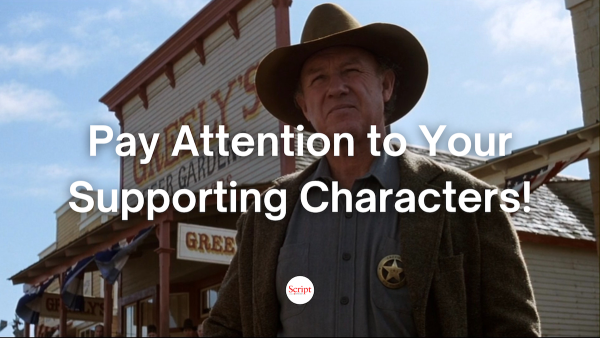Jeanne’s Screenwriting Tips: Writer’s Survival – Trust Your Gut
Being able to trust your gut is essential for a writer’s survival. Jeanne Veillette Bowerman gives advice on how to survive relationships and this insane industry.
You don’t get to be my age without having your heart ripped out a few dozen times, professionally and personally. I used to put on those rose-colored glasses and believe the best in people and in my projects.
How’d that work for me?
*insert hysterical laughter*
Because I’m a Spidey-sense girl, I now live by one rule above all others – trust your gut.
This holds true for your relationships and your screenwriting.
Let’s start with the top two trust-your-gut relationship situations (bonus: these apply to dating too).
1. Red flags. If you’re working with someone that sends red flags shooting in the air, pay attention. I’ve had disappointments from producers, writing partners, and even friends who I trusted. Sadly, not everyone has good intentions. If something seems too good to be true, it probably is.
2. As for intentions… the road to hell is paved with the best of them. I’m sure most of you have heard the line from Sex and The City, “He’s just not that into you.” Believe it or not, there are people in Hollywood who are indeed sweet and kind but simply don’t want to be the one to break a writer’s heart. So they tell you nice things instead of just ripping off the bandage and giving it to you straight.
Sure, I understand it’s hard to “break up” with a creative partner, but the best thing a writer can hear is the truth. If you feel like someone just isn’t that into your project, it’s okay to set him/her free. Trust your gut. Like my grandmother used to always say, "You can’t find Mr. Right if you don’t let go of Mr. Wrong."
But relationships are only a part of your screenwriting career dilemmas. Getting your script on the page is always the first step.
How does trusting your gut relate to your writing?
I get a lot of emails and tweets from frustrated writers asking how to get started on their project or how to organize their notes, but all boiling down to one thing:
What’s the formula for writing a screenplay?
Trusting your gut.
Yes, you read that correctly. It’s not a beat sheet, a series of sequences, or a story map. Writing all comes down to you being an effective storyteller.
Read scripts, understand what the experts are talking about when they speak of “formula,” watch movies, but the most important thing you can do is to sit your ass in the chair, write it all down, and trust your gut.
No first draft is ever going to sell. It's called "first" for a reason. The point of writing a first draft is to vomit on the page, creating something to work with. Index card your scenes, use an outline, storyboard it. I don’t care what you do or how you do it. All I care is that you write it down in some sort of structure that makes for good storytelling (we have a free story structure download that might help).
Trust your gut.
It’s your story. You’re the one who was inspired to write it. Don’t wait for someone to give you a secret trick to doing it. They don’t know your story; therefore, they don’t know the best way to tell it. That’s up to you.
The same goes for story ideas. Trust your gut when it comes to picking them. Your story has to resonate with you, giving you goosebumps of joy at the thought of potentially spending the next couple of years with it. The more you are passionate about your idea, the more you’ll bleed on the page and make your story compelling.
Now comes the tricky part of trusting your gut… when money is involved.
It’s hard to turn down a paid writing gig, but sometimes you gotta do it, as much as that hurts to admit.
When I make decisions on what projects to accept, I always trust my gut.
Recently, I turned down two. One, because the project didn’t speak to me. When a producer approaches me for a rewrite gig, before I ever talk money, I ask for the script. If that story doesn’t resonate with me, I know I’m not the writer for the job. Sure, I could deliver a great rewrite, but with a full-time job, my writing hours are limited. I can’t justify putting my own writing aside to take on a rewrite job when the story doesn’t jazz me. It’s just not worth it.
When I value the relationship with a producer, I always under-promise and over-deliver. That way, I get called back for more jobs. Passing on this one was a no brainer. He trusts my gut, knowing we'll find another project to collaborate on in the future.
The second one I turned down was because of the creative's personality. I knew exactly how to fix the story, but the more I spoke with him on the phone, the higher the price tag went up in my mind as to what it would take to get me to work with him. He was defensive, resistant, talked in circles, contradicted himself, and struck me as, well, unprofessional. By the end of the call, I pulled a Shark Tank and declared, “I’m out.” He followed with multiple emails asking me to reconsider, but I had to trust my gut.
The paycheck would have been lovely, but the stress of working with someone who set my Spidey senses on high alert wasn’t worth it. Life is too short.
#PIMPtipoftheday: The only way to stay sane in this insane business is to trust your gut.
Going forward, I urge you to pay attention to the red flags and listen to your Spidey senses. We have them for one reason and one reason only – survival.
Jeanne Veillette Bowerman is a Senior Executive at Pipeline Media Group and Book Pipeline, Editor-in-Chief of Pipeline Artists, Director of Symposium—a year-round conference in the arts, co-host "Reckless Creatives" podcast, partner at Fringe Press, former Editor-in-Chief of Script magazine and a former Senior Editor at Writer's Digest. Recognized as one of the "Top 10 Most Influential Screenwriting Bloggers," her "Balls of Steel" column was selected as recommended reading by Universal Writers Program. A compilation of her articles is now available at The Writers Store—Balls of Steel: The Screenwriter's Mindset. She is also Co-Founder and moderator of X's weekly screenwriters’ chat, #Scriptchat, and wrote the narrative adaptation of the Pulitzer Prize-winning book, Slavery by Another Name, with its author, Douglas A. Blackmon, former senior national correspondent of The Wall Street Journal. More information can be found on her website. X: @jeannevb | IG/Threads: @jeannevb_ | BlueSky: @jeannevb.bsky.social







